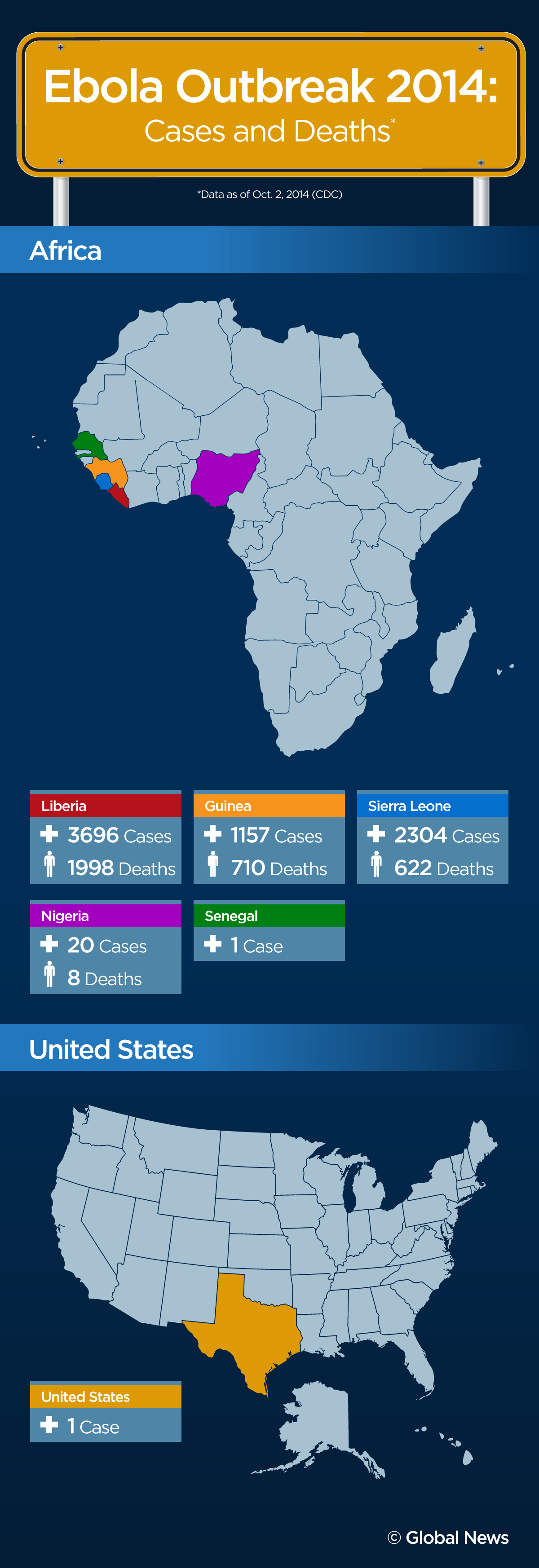Watch the video above: CDC director downplays fears of Ebola outbreak.

TORONTO – As of Oct. 2, the Centers for Disease Control (CDC) had reported 7,179 cases of Ebola around the world, with all but one of them in West Africa. So why aren’t governments around the world issuing travel bans to these countries?
The World Health Organization (WHO) said in an email response to Global News that, in accordance with advice from the WHO Ebola Emergency Committee, they “do not recommend any ban on international travel or trade.”
READ MORE: How does Ebola spread? 5 things you need to know
“Unlike infections such as influenza or tuberculosis, Ebola is not airborne,” said Dr. Isabelle Nuttall, Director of WHO Global Capacity Alert and Response. “It can only be transmitted by direct contact with the body fluids of a person who is sick with the disease.”

The response also stated that, usually when someone is sick with Ebola, they are too ill to travel and that “on the small chance” that anyone on a plane is infected with Ebola, the chance of other passengers and crew having contact with their body fluids is small.
“Because the risk of Ebola transmission on airplanes is so low, WHO does not consider air transport hubs at high risk for further spread of Ebola,” said Nuttall.
However, on late Wednesday it was revealed that a patient was admitted to a hospital in Dallas after contracting the disease. The patient had returned from Liberia.
On Friday, Toronto’s University Health Network confirmed that a patient who had recently travelled to West Africa was admitted to one of its four hospitals.
READ MORE: American cameraman working for NBC in Liberia tests positive for Ebola
A travel advisory has been in place in Canada since Sept. 8 for Nigeria, Guinea, Liberia, Sierra Leone, and Senegal, issued by the Public Health Agency of Canada.
For Guinea, Liberia and Sierra Leone, countries that total a whopping 7,157 (as of Oct. 2) of the known cases, the level is at 3 out of four on the agency’s Levels of Risk. This is a warning to Canadians to “avoid non-essential travel in order to protect the health of Canadian travellers and the Canadian public.”
Level 4, according to the office, “advises travellers to avoid all travel in order to protect the health of the Canadian public. A notice at this level would be issued if there is a high risk of spread of disease to the general public regardless of measures taken while travelling.”
However, because Ebola is not considered an easily transmittable disease, it does not meet the Level 4 criteria.
The CDC in Atlanta, Georgia, has also issued a travel advisory for Liberia, Sierra Leone and Guinea, urging U.S. residents to avoid all non-essential travel. It is the agency’s highest alert.
Comparatively, the 2003 outbreak of severe acute respiratory syndrome (SARS) in Toronto — an illness that could be passed on by close contact and was airborne — resulted in a similar travel advisory.
In the U.S., the federal government has come under attack by Republicans for not banning all travel to and from these countries.
However, CDC Director Tom Frieden said that closing the border would do little to help.
“The fact is that if we tried to seal the border, it would not work because people are allowed to travel,” he said Friday on ABC’s Good Morning America. Blocking travel, he said, “would backfire because it would make it harder to stop the outbreak.”
The Department of Foreign Affairs and Public Health Agency of Canada had not responded to requests for comment at the time of publication.
–with files from The Associated Press


Comments